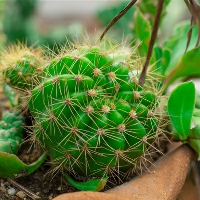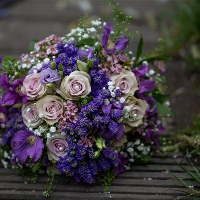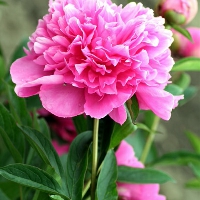The Young King 1
it was the night before the day fixed1 for his coronation(加冕礼) , and the young king was sitting alone in his beautiful chamber2. his courtiers had all taken their leave of him, bowing their heads to the ground, according to the ceremonious usage of the day, and had retired3 to the great hall of the palace, to receive a few last lessons from the professor of etiquette4; there being some of them who had still quite natural manners, which in a courtier is, i need hardly say, a very grave offence.
the lad(少年,小伙子) - for he was only a lad, being but sixteen years of age - was not sorry at their departure, and had flung himself back with a deep sigh of relief on the soft cushions of his embroidered5 couch, lying there, wild-eyed and open-mouthed, like a brown woodland faun, or some young animal of the forest newly snared6 by the hunters.
and, indeed, it was the hunters who had found him, coming upon him almost by chance as, bare-limbed and pipe in hand, he was following the flock of the poor goatherd(牧羊人) who had brought him up, and whose son he had always fancied himself to be. the child of the old king's only daughter by a secret marriage with one much beneath her in station - a stranger, some said, who, by the wonderful magic of his lute-playing, had made the young princess love him; while others spoke7 of an artist from rimini, to whom the princess had shown much, perhaps too much honour, and who had suddenly disappeared from the city, leaving his work in the cathedral unfinished - he had been, when but a week old, stolen away from his mother's side, as she slept, and given into the charge of a common peasant and his wife, who were without children of their own, and lived in a remote part of the forest, more than a day's ride from the town. grief, or the plague, as the court physician stated, or, as some suggested, a swift italian poison administered in a cup of spiced wine, slew8, within an hour of her wakening, the white girl who had given him birth, and as the trusty messenger who bare the child across his saddle-bow, stooped from his weary(疲倦的) horse and knocked at the rude door of the goatherd's hut, the body of the princess was being lowered into an open grave that had been dug in a deserted9 churchyard, beyond the city gates, a grave where, it was said, that another body was also lying, that of a young man of marvellous and foreign beauty, whose hands were tied behind him with a knotted cord, and whose breast was stabbed with many red wounds.
such, at least, was the story that men whispered to each other. certain it was that the old king, when on his death-bed, whether moved by remorse10 for his great sin, or merely desiring that the kingdom should not pass away from his line, had had the lad sent for, and, in the presence of the council, had acknowledged him as his heir.
and it seems that from the very first moment of his recognition he had shown signs of that strange passion for beauty that was destined11 to have so great an influence over his life. those who accompanied him to the suite12 of rooms set apart for his service, often spoke of the cry of pleasure that broke from his lips when he saw the delicate raiment(衣服) and rich jewels that had been prepared for him, and of the almost fierce joy with which he flung aside his rough leathern(皮制的) tunic13(束腰外衣) and coarse(粗糙的) sheepskin cloak. he missed, indeed, at times the fine freedom of his forest life, and was always apt to chafe14 at the tedious court ceremonies that occupied so much of each day, but the wonderful palace - joyeuse, as they called it - of which he now found himself lord, seemed to him to be a new world fresh-fashioned for his delight; and as soon as he could escape from the council-board or audience-chamber, he would run down the great staircase, with its lions of gilt15 bronze and its steps of bright porphyry, and wander from room to room, and from corridor to corridor, like one who was seeking to find in beauty an anodyne16 from pain, a sort of restoration from sickness.
upon these journeys of discovery, as he would call them - and, indeed, they were to him real voyages through a marvellous land, he would sometimes be accompanied by the slim, fair-haired court pages, with their floating mantles17, and gay fluttering ribands; but more often he would be alone, feeling through a certain quick instinct, which was almost a spanination18(预测,占卜) , that the secrets of art are best learned in secret, and that beauty, like wisdom, loves the lonely worshipper.
many curious stories were related about him at this period. it was said that a stout19 burgomaster, who had come to deliver a florid oratorical20(演说的) address on behalf of the citizens of the town, had caught sight of him kneeling in real adoration21 before a great picture that had just been brought from venice, and that seemed to herald22(通报,预示) the worship of some new gods. on another occasion he had been missed for several hours, and after a lengthened23 search had been discovered in a little chamber in one of the northern turrets24 of the palace gazing, as one in a trance, at a greek gem25 carved with the figure of adonis. he had been seen, so the tale ran, pressing his warm lips to the marble brow of an antique statue that had been discovered in the bed of the river on the occasion of the building of the stone bridge, and was inscribed26 with the name of the bithynian slave of hadrian. he had passed a whole night in noting the effect of the moonlight on a silver image of endymion.
 约伴故友 2024-04-19 12:59:11
约伴故友 2024-04-19 12:59:11









